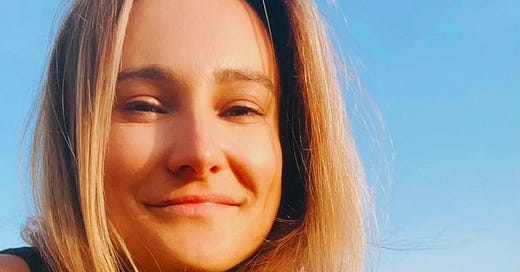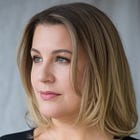CR 042: Amelia Ireland on Grief, Loss, and Juicy Plot Twists
The author discusses her debut novel, "The Seven O’Clock Club."
Amelia Ireland’s debut novel, The Seven O’Clock Club, is, at its core, about grief and how we each have our own way of dealing with loss. But thanks to a shocking plot twist that completely changes the trajectory of the story, it is an unputdownable read that Publishers Weekly is calling “a high-wire act” and “’irresistible.”
The story focuses on four strangers—privileged Victoria, sensitive Mischa, heartbroken Freya, and heartthrob Callum—who are selected by a woman named Genevieve to participate in an experimental form of group therapy. Each of the four has experienced loss and they gather once a week in Genevieve’s flat to discuss their heartbreak in the hopes of moving on. As the four of them share their stories in the weekly sessions, their lives become intertwined, though they soon learn they’re connected in ways they never could have imagined.
Ireland recently took a break from her day job as a lawyer to chat with me about the writing of the novel, the challenges of including a major plot twist, and how it all came about thanks to a Will Smith movie.
This content contains affiliate links. I am an affiliate of Bookshop.org and I will earn a commission if you click through and make a purchase.
SANDRA EBEJER: Congratulations on your book! It’s such a long journey to get a novel out into the world. Do you still feel as connected to the story, or is it a strange experience to be talking about it after so much time?
AMELIA IRELAND: No, [I’m still] really connected to it, I think because I read it again relatively recently. I got so excited when the hard cover copies arrived from the publisher that I actually read it in bed as my nightly read for a bit. Reading it as a book felt different to when I’d been editing it, because that was a lot more critical and focused on particular chapters, and it’s been a long time since I’ve read it as a story. So, as a result, I would say I definitely feel connected to it again.
Where did the idea for the book come from?
I was on a work flight, and I watched a film called Collateral Beauty, which is a Will Smith film. It’s about an advertising executive who loses his daughter at a very young age, and his inability to get past it. The plot becomes quite unusual, but I remember watching the film and being really, really moved by it. It taught me that people dealt with grief in very different ways. My own mother had passed away about 10 years prior at that point, and I’d always wanted to write something as a tribute to her and the experience I had with her illness and losing her. I’d also had a couple of friends that had gone through sad times themselves, and we’d all dealt with it in very different ways. So it occurred to me that I wanted to write a book which was multiple perspectives of different people’s journeys through the grief process, but I wanted to intertwine them and make an exciting and unusual plot at the same time.
It started very simply, but when I started writing, I thought, “I want to make this more interesting. I want to make it more hopeful.” I didn’t want it to be a hugely depressing novel about grief and there were different elements that I wanted to include. I wanted a bit of romance and a bit of a love story. I wanted to make the plot unexpected, because I didn’t want it to just be you find out their stories at the end of the book and that’s that. I wanted to create a bit of intrigue. So all of those factors combined to result in the book.
There’s a huge plot twist about two-thirds of the way into the book. Was it difficult to write, knowing you had to lead to that but had to avoid any kind of spoilers?
Yeah. The chapter where the twist comes about was by far the hardest chapter that I wrote at any point during the whole book. It took a whole day of crafting and recrafting. I wanted it to be a surprise but not be so unrealistic that everyone was then really annoyed by the fact that it had happened. And then once I’d written the chapter, I went back and thought about ways that I could drop in small clues which I’d like to think aren’t obvious enough that people guess, but if you read it again, you would think, “Oh yeah. I see why that’s that, and I see why that’s that.” That part was actually more fun because I knew what I was doing at that point, so I enjoyed going back and adding those little bits in.
You mentioned that you started working on this book after the death of your mother. Did writing the book help you in any way to navigate your own journey with grief?
I think so, yeah. I’d come to terms with it by that point because it had been a long time since she passed away. But I think there were probably things that I wanted to remember, and it gave me a chance to relive certain memories which, at the time, weren’t necessarily that enjoyable, but were important, because it was part of who she was. It made me relive my time with her again when I probably buried some of that, I think. So, yeah, it was definitely a cathartic process, for sure.
You shared in the acknowledgements that you needed some help in developing Callum because you knew nothing about the music world. Were there characters or aspects of the book that were harder to write than others?
Yeah. Callum, full stop. When I wrote a very, very first draft, I gave it to a friend to read and her main feedback was, “You can totally tell he’s not a guy.” [Laughs] I’d probably written it in a feminine way or not really thought about how he would talk, or maybe I’d even exaggerated the character to too much of an extent. I remember thinking, because his character is so important, “I definitely don’t want the feedback that ‘you can tell a woman’s written this character.’” I decided I was going to have to put some work into developing his character properly.
By complete chance, I met a musician who had gone through a lot of [what Callum experienced], and was really happy to talk about how it had been for him—being in the public eye to some extent, and what it was like to go through something that’s quite personal and destructive, but with everyone having an opinion. His insights were super helpful. And then he introduced me to one of his friends who had some very rock and roll stories to tell. So some of the things I put into the book I knew were realistic because things like that do happen. But I would say that character took the most work, so it’s probably the one I’m the most proud of, in the sense that it was a foreign character to me entirely and hopefully I did it some justice.
There are some really interesting conversations in the book about the afterlife, and they’re discussed from more of a scientific than spiritual point of view. Without giving anything away, how much of this part of the book was plotted out in advance and how much came about during the writing process?
I always wanted the characters to have a full range of different beliefs. I think when you’re grieving someone, you automatically want there to be other things, such as the afterlife, or things that you can cling to, I guess. If you’re religious, that comes with the territory. But if you’re not, you still maybe want some justification that there is something else. So when I was writing about those kinds of themes, I wanted it to be a full range of possibilities, not necessarily something conventional. And I really like using my imagination as well, so I wanted to come up with something that was maybe unusual but also believable. I think that’s also the lawyer in me; I didn’t want anyone to have an idea unless there was a logical justification for it.
Actually, in the editing process, there was a lot more discussion about those kinds of themes that I included, and we ended up not including it in the final version, because I think it went into a bit too much detail. It was almost like a kind of thesis, and I think it made the book a better read by dropping it.
You mentioned that you’re also a lawyer. Have you always written on the side? When did you know you wanted to be an author?
I used to want to be an actress when I was young, up until the age of about 15, 16, and so I’ve always had that imagination, but the imaginative outlet was acting. I did a lot whilst I was at school. And then when I went to university, my dad basically said, “You need to get a proper qualification, just so that if acting doesn’t work out for you, you’ve got something to fall back on.” I went to university and got sucked into the more professional world of law, but I always wanted that creative outlet. It was the one thing that was missing from my job. So I did start toying around with some [novel] ideas in my 20s. Nothing really worked out. And then suddenly, out of the blue, I just had the idea for this book.
I know The Seven O’Clock Club is just coming out, but do you have anything new that you’re working on? What’s next for you?
Yes. I have started on book number two. It’s in fairly early stages at the moment. It’s something completely different, but also a bit of a wild idea. I’m scoping it out at the moment.
Knowing what you know now about writing a novel and the publishing process, is there anything you would do differently?
I don’t think so. I think the hardest part is what everyone always says—getting an agent and getting a publishing deal. I tried for a couple of years to get an agent and failed, and kept trying, and I don’t think anything I could have done would have made that happen any quicker. I do think so much is about right place, right time when it comes to these things. I do believe things happen for a reason when they happen. I guess I’m a bit fatalistic in that sense. So, in an ideal world, it would have been great if I’d gotten an agent a week after I finished my first draft, but that just wasn’t meant to be. So I just carried on trying and then got there eventually.
Do you have any advice for aspiring novelists?
My only advice is to write and keep writing until you finish. The reason I think I didn’t finish other books earlier was because I’m quite self-critical, and I would go back and reread and change, reread and change, and then I would never get past the first three chapters. For some reason, this time, I just remember thinking, “I’m not gonna finish this unless I just keep writing and don’t look back.” I didn’t reread anything until I got about two-thirds the way through, and then I had to go back to make a few other things work. But definitely just go for it and don’t worry about correcting or editing, because when you finish your first draft, you’re so proud of the fact that you’ve done that, then suddenly the editing process and any rewrites you need to do just pale into insignificance.
To learn more about Amelia Ireland, find her on Instagram.
To purchase The Seven O’Clock Club, click here.
This interview has been edited for clarity and length.
You might also enjoy…









